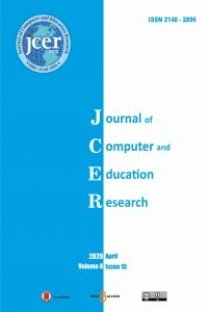Online Education Skills of Teachers: Four Axes of Gaps
Online education, teachers, administrative skills, , technological skills, web-based skills, gaps
Online Education Skills of Teachers: Four Axes of Gaps
Teachers, Administrative Skills, Technological Skills, Web-based Skills,
___
- Acar, (2020). An investigation of grade level and gender-based science achievement gaps in schools with different science achievement levels. Pegem Eğitim and Öğretim Dergisi, 10(1), 01-16.
- Ahmed, A. (2007). Open access towards bridging the digital divide–policies and strategies for developing countries. Information Technology for Development, 13(4), 337-361. Anderson, S., Medrich, E., & Fowler, D. (2007). Which achievement gap? Phi Delta Kappan, 88 (7), 547-550.
- Arslan, S., Kutluca, T., & Özpınar, İ. (2011). Investigating mathematics teacher candidates’ opinions about using information & communication technologies. Cypriot Journal of Educational Sciences, 6 (2), 75-82.
- Bhanji, Z. (2008). Transnational corporations in education: filling the governance gap through new social norms and market multilateralism? Globalisation, Societies and Education, 6(1), 55–73.
- Brown, J. D. (2016). Introducing needs analysis and English for specific purposes. New York, NY: Routledge.
- Çebi, A., & Reisoğlu, İ. (2019). A training activity for improving the digital competences of pre-service teachers: The views of pre-service teacher in CEIT and other disciplines. Educational Technology Theory and Practice, 9(2), 539-565.
- Çoban, M. (2020). The experiences of the prospective information technology teachers taking the multimedia design and production course with project-based learning method: a case study. Journal of Computer and Education Research, 8 (16), 720-737. http://doi.org/10.18009/758956
- Clarke, A., Milner, H., Killer, T. & Dixon, G. (2008). Bridging the digital divide. Adults Learning, 20 (3), 20-22.
- Elsayed, A. (2019). Effectiveness of project-web learning approach in the development of action research skills among master’s students in oman. Arab World English Journal, 5, 51-64.
- Gill, L., Dalgarno, B., & Carlson, L. (2015). How does pre-service teacher preparedness to use ICTs for learning and teaching develop through their degree program? Australian Journal of Teacher Education, 40(1), 36-60.
- Goldhaber, D. Quince, V., Theobald & R. (2019). Teacher quality gaps in U.S. public schools: trends, sources, and implications, Phi Delta Kappan, 100 (8), 14-19.
- Gudmundsdottir, G. B., & Hatlevik, O. E. (2018). Newly qualified teachers’ Professional digital competence: implications for teacher education. European Journal of Teacher Education, 41(2), 214-231.
- Gregory, A., Skiba, R. J., & Noguera, P. A. (2010). The achievement gap and the discipline gap: Two sides of the same coin? Educational Researcher, 39(1), 59- 68.
- Gunga, S.O. & Ricketts, I.W. (2007). Facing the challenges of e-learning initiatives in African universities. British Journal of Educational Technology, 38(5), 896-906.
- Durak, H., Saritepeci, M., & Çakır, H. (2016), An in-service training of teachers on the model proposal: web-based in-service professional development model. Journal of Computer and Education Research, 4(8), 222-248.
- Fraenkel, J. R., Wallen, N. E., & Hyun, H. H. (2012). How to design and evaluate research in education (8th ed.). New York: McGraw-Hill Fraenkel, J. R., Wallen, N. E., & Hyun, H. H. (2012). How to design and evaluate research in education (8th ed.). New York: McGraw-Hill.
- Hargittai, E. (2003). The digital divide and what to do about it. In: Jones D. Editor, New economy handbook, (pp. 821-839). San Diego and London: Elsevier, Academic Press.
- Kayak, S., & Kır, E. (2015). Assessing candidate language teachers’ level of knowledge and ideas towards the use of interactive. Journal of Computer and Education Research, 3(5), 50-77.
- Piskurich, G. M. (2003). Preparing learners for e-learn, ING. Danvers, CA: Pfeiffer.
- Reardon, S. F. (2013). The widening income achievement gap. Educational Leadership, 70(8), 10-16.
- Ramírez-Montoya, M. S., Mena, J., & Rodríguez-Arroyo, J. A. (2017). In-service teachers’ self-perceptions of digital competence and OER use as determined by a xMOOC training course. Computers in Human Behavior, 77, 356-364.
- Tuncay, N. & Uzunboylu, H. (2008). A research study about "e-learning training needs" of vocational bilingual teachers in north Cyprus. Proceedings of 7th European Conference on e-Learning, 2, 590-598, Nov 06-07, 2008 Agia Napa, Cyprus.
- Tuncay, N., Stanescu, IA. & Uzunboylu, H. (2009, October). Do teachers e-learning needs differentiate among countries? 8th European Conference on e-Learning, 29-30 October 2009, Monolingual of Bari, Italy.
- Tuncay, N., & Uzunboylu, H. (2010). A research study about “e-learning training needs” of vocational bilingual teachers in north Cyprus, Proceedings of 7th European Conference on e-Learning, Nov 06-07, 2008 Agia Napa, Cyprus,13(1), 590-598.
- Tuncay, N., & Uzunboylu, H. (2008). A research study about "e-learning training needs" of vocational bilingual teachers in north Cyprus. Proceedings of 7th European Conference on e-Learning, V.2 P.590-598, Nov 06-07, 2008 Agia Napa, Cyprus.
- Uzunboylu, H. & Tuncay, N. (2009). E-learning divides in north Cyprus. Asia Pacific Education Review, 10, 281-290.
- Uzunboylu, H. & Tuncay, N. (2010). Divergence of digital world of teachers. Educational Technology & Society, 13(1), 186-194.
- Yalman, M. & Kutluca, T. (2013). Matematik öğretmeni adaylarının bölüm dersleri için kullanılan uzaktan eğitim sistemi hakkındaki yaklaşımları [Mathematics prospective teachers' approaches towards the distance education system used for the department courses]. D.Ü Ziya Gökalp Eğitim Fakültesi Dergisi, 21, 197-208.
- Youssef, A.B. & Ragni, L. (2008). Uses of information and communication technologies in europe’s higher education institutions: from digital divides to digital trajectories, The Economics of E-learning, 5 (1), 72-85.
- Yayın Aralığı: 2
- Başlangıç: 2013
- Yayıncı: Tamer KUTLUCA
Mithat ELÇİÇEK, Hüsamettin ERDEMCİ
Ortaokul Öğrencilerinin Matematik Öz Yeterlik Düzeylerinin İncelenmesi
Güney HACIÖMEROĞLU, Özlem ELMALI
Okul Öncesi Öğretmenlerinin Sınıf Yönetimine Dair Görüşleri
Gizem Sebahat ÇOBAN, Mehmet Necati CİZRELİOĞULLARI
Mıknatıs Konusunun Öğretimine Yönelik Geliştirilen Eğitsel Bir Oyun Hakkında Öğretmen Görüşleri
Aslıhan ERTUĞRUL, Orhan KARAMUSTAFAOĞLU
The Problems of Teachers Who Have Immigrant Students in their Classes and Solutions
Online Education Skills of Teachers: Four Axes of Gaps
Lise Öğrencilerinin Çevrimiçi Oyun Tercihleri ile Çevrimiçi Oyun Oynama Bozuklarının İncelenmesi
